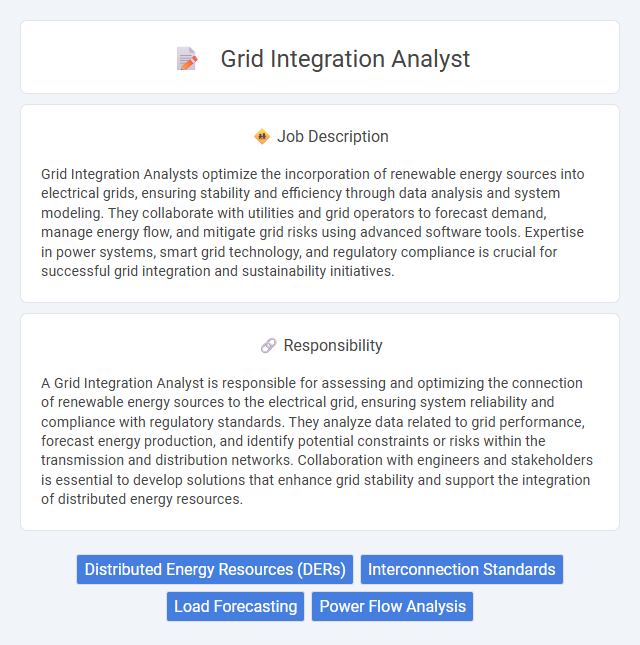
Grid Integration Analysts optimize the incorporation of renewable energy sources into electrical grids, ensuring stability and efficiency through data analysis and system modeling. They collaborate with utilities and grid operators to forecast demand, manage energy flow, and mitigate grid risks using advanced software tools. Expertise in power systems, smart grid technology, and regulatory compliance is crucial for successful grid integration and sustainability initiatives.
Individuals with strong analytical skills and a background in electrical engineering or energy systems may be well suited for a Grid Integration Analyst role, as it requires assessing power systems and integrating renewable energy sources efficiently. Those comfortable working with complex data models and simulations are likely to perform better, given the technical nature of grid management and forecasting. Candidates who prefer dynamic problem-solving and collaboration across multidisciplinary teams might find this job both challenging and rewarding.
Qualification
A Grid Integration Analyst requires a strong background in electrical engineering or energy systems, with expertise in power grid operations and renewable energy integration. Proficiency in data analysis tools, grid simulation software, and regulatory standards related to grid stability is essential. Candidates should possess excellent problem-solving skills and experience with smart grid technologies and energy storage solutions.
Responsibility
A Grid Integration Analyst is responsible for assessing and optimizing the connection of renewable energy sources to the electrical grid, ensuring system reliability and compliance with regulatory standards. They analyze data related to grid performance, forecast energy production, and identify potential constraints or risks within the transmission and distribution networks. Collaboration with engineers and stakeholders is essential to develop solutions that enhance grid stability and support the integration of distributed energy resources.
Benefit
Grid Integration Analysts likely enhance the reliability and efficiency of power systems by optimizing the incorporation of renewable energy sources. Their work probably supports the reduction of energy costs and environmental impact by facilitating smoother grid operations. Companies that employ these analysts may experience improved compliance with regulatory standards and increased grid stability.
Challenge
Grid Integration Analyst roles likely involve complex challenges related to balancing energy supply and demand within increasingly decentralized power grids. Navigating the integration of renewable energy sources may require advanced modeling and real-time data analysis to ensure grid stability. The position probably demands continuous adaptation to evolving regulatory frameworks and technological advancements, posing significant analytical and problem-solving challenges.
Career Advancement
A Grid Integration Analyst plays a critical role in optimizing the connection between renewable energy sources and power grids, driving advancements in smart grid technology. Expertise in data analysis, grid stability, and renewable integration enhances career progression opportunities in energy companies and utility providers. Mastery of emerging standards and software tools positions professionals for senior technical roles and strategic leadership in the clean energy sector.
Key Terms
Distributed Energy Resources (DERs)
Grid Integration Analysts specializing in Distributed Energy Resources (DERs) evaluate the impact of renewable energy sources, such as solar panels and battery storage systems, on power grid stability and efficiency. They analyze grid data to optimize DER deployment, ensuring seamless integration with existing infrastructure while maintaining grid reliability. Their expertise supports utility companies in managing decentralized energy production and advancing smart grid technologies.
Interconnection Standards
A Grid Integration Analyst specializing in Interconnection Standards ensures that renewable energy sources comply with local and national grid requirements for seamless connection and operation. They analyze technical specifications, conduct impact assessments, and collaborate with utilities to streamline interconnection application processes, enhancing grid stability and reliability. Expertise in IEEE and NERC standards is critical for optimizing system performance and facilitating efficient energy integration.
Load Forecasting
A Grid Integration Analyst specializing in Load Forecasting uses advanced statistical models and machine learning algorithms to predict electricity demand patterns accurately. They analyze historical load data, weather variables, and consumption trends to support grid stability and optimize energy distribution. Their work directly contributes to minimizing outages and enabling efficient integration of renewable energy sources into the power grid.
Power Flow Analysis
A Grid Integration Analyst specializing in Power Flow Analysis evaluates and models the electrical grid to ensure efficient energy distribution and system reliability. They utilize advanced software tools like PSS(r)E and PowerWorld Simulator to simulate load flows, identify congestion points, and optimize network configurations. Key responsibilities include analyzing real-time power flow data, coordinating renewable energy integration, and supporting grid expansion projects to meet demand while maintaining stability.
 kuljobs.com
kuljobs.com